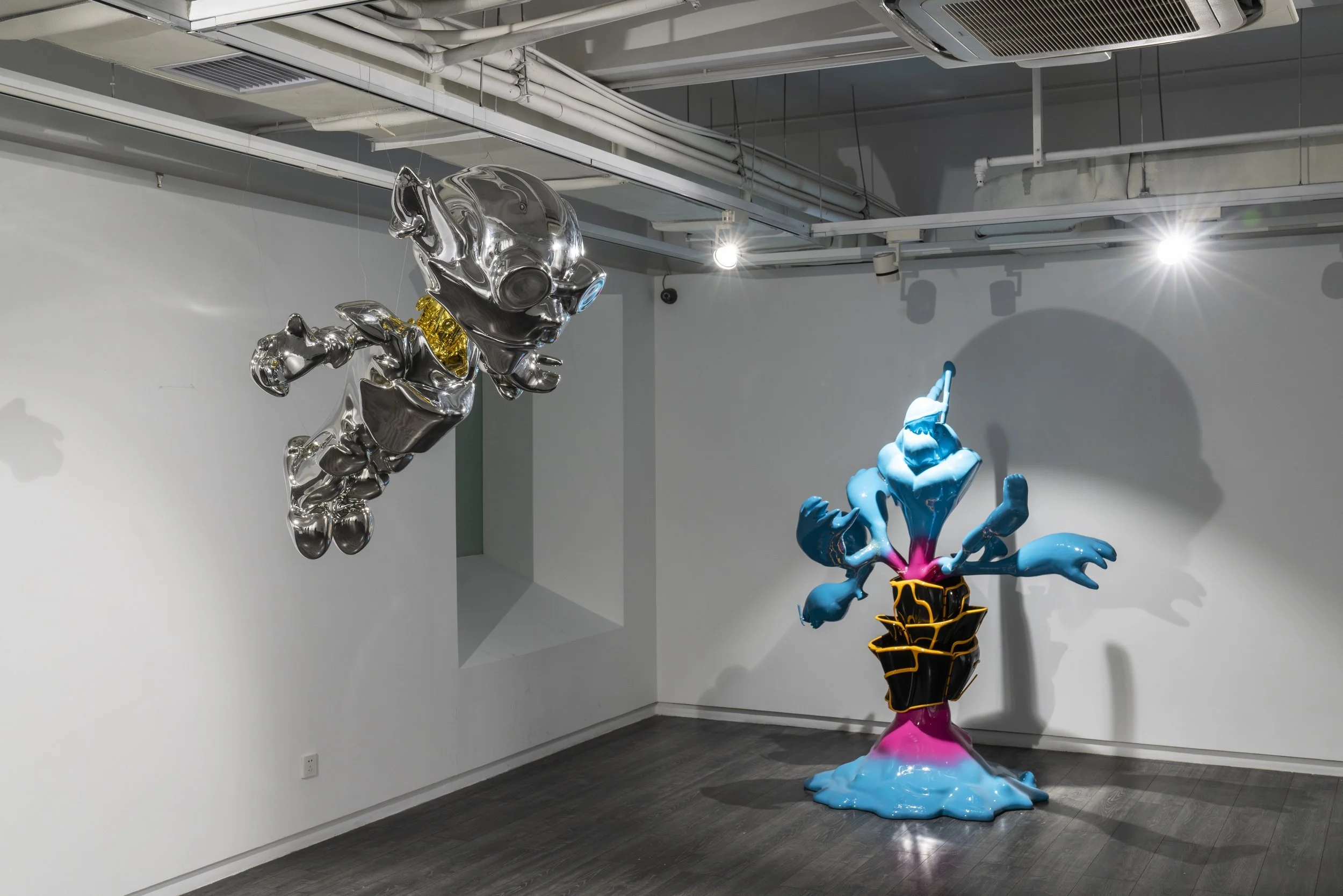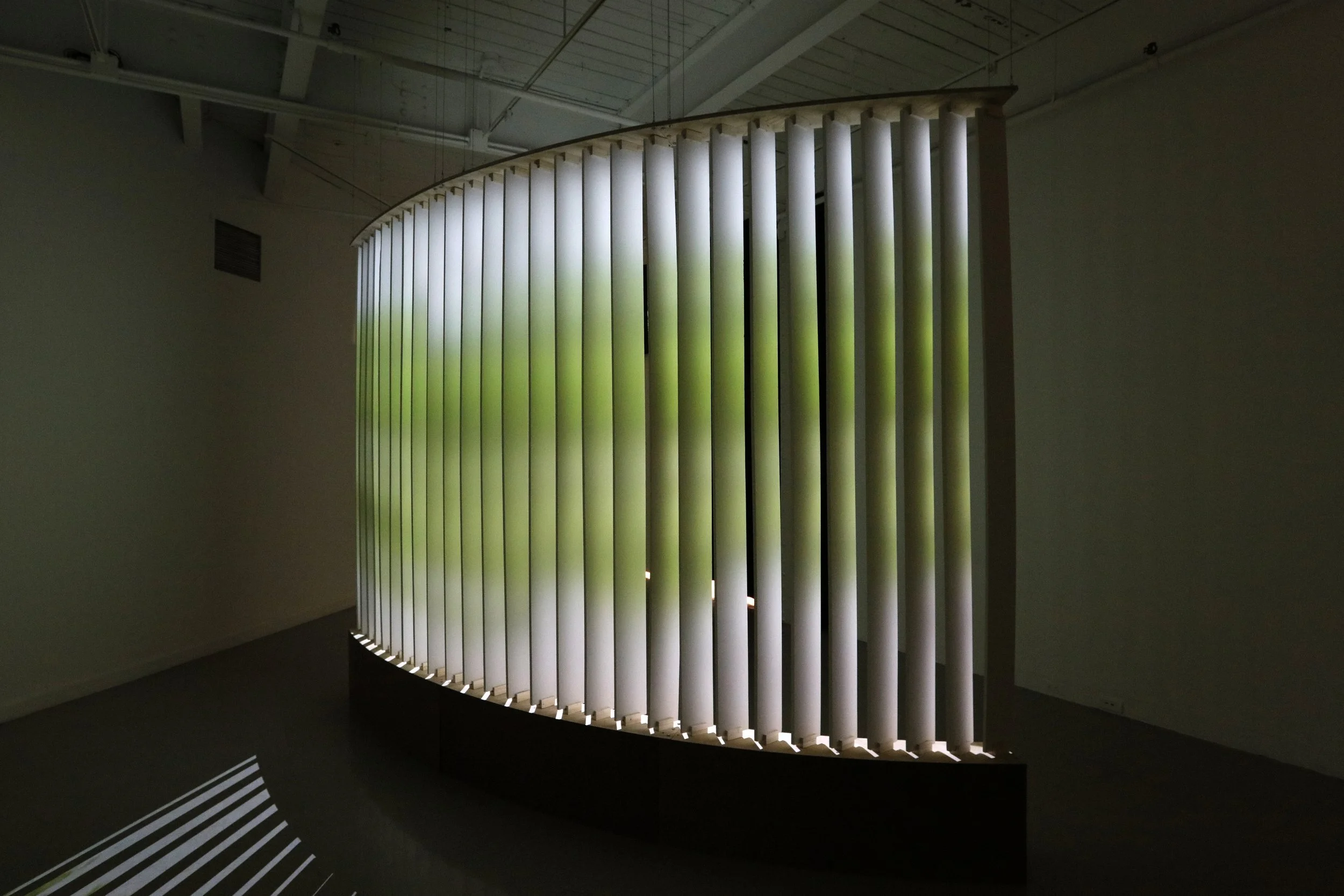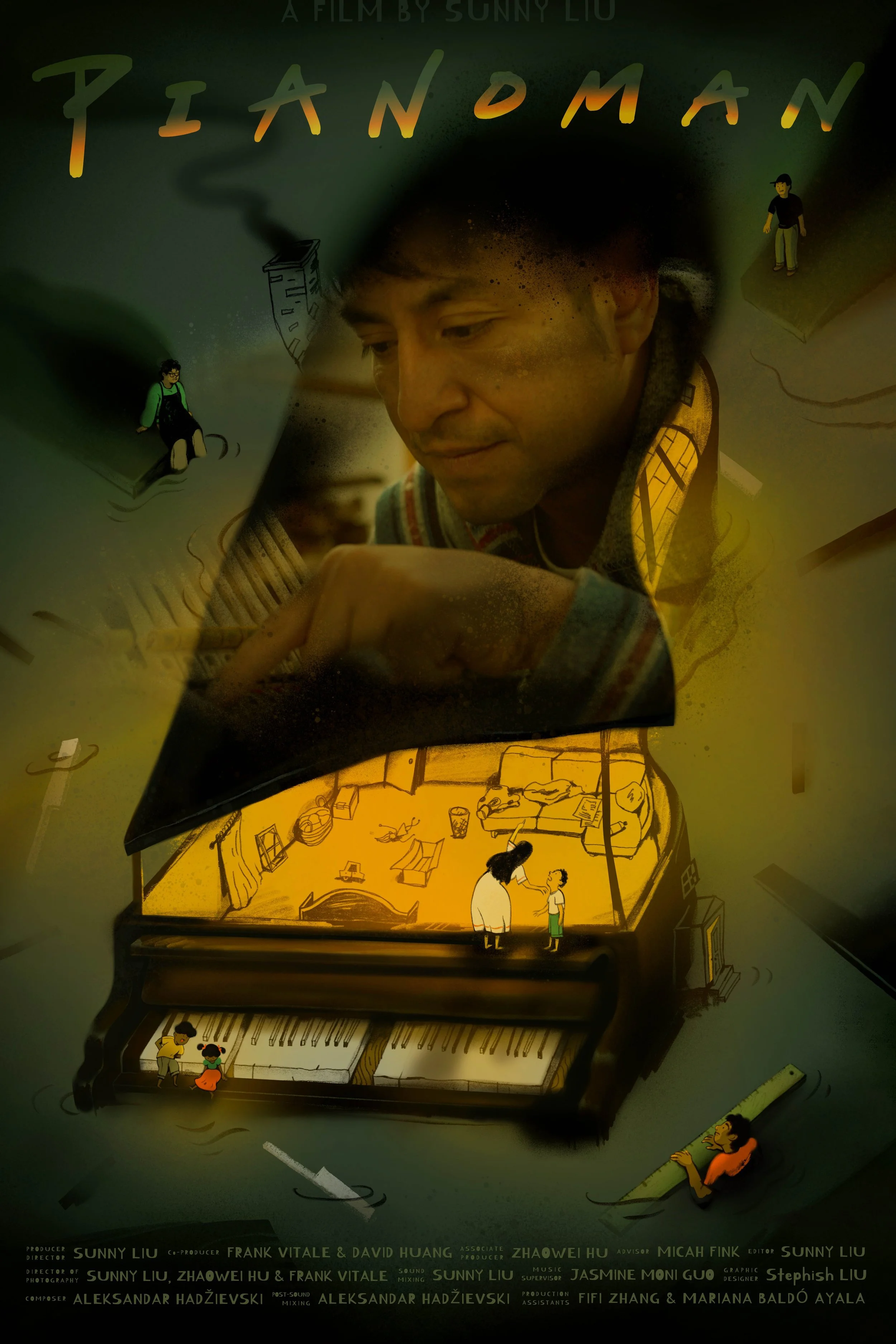10 Questions with FEYU (Yu Li)
Al-Tiba9 Art Magazine ISSUE16 | Featured Artist
FEYU (Yu Li) is a Chinese multimedia artist and filmmaker based in London, known for creating alternative realities and fantasies using emerging technologies. Her practice is a blend of research and emotional introspection, examining how technology shapes spatial, philosophical, and cultural infrastructures. She focuses on themes like agency, shame/desire, and cultural identities in digital landscapes.
Through her creative worldbuilding, Yu examines the emotionality, aesthetics, and architecture within networked realities. She articulates cyber subjectivities through the asymmetrical extraction of lands, bodies and information, while envisioning futures where humans and machines coexist in complex, evolving relationships. Her body of work spans films, narrative games, immersive installations, and critical writings. A notable project, "Elysia, Kill Me at the Dinner Party", is a CG short film that investigates performative identity-making and power struggles in cyberspace, earning her the "Best Female Director Super Short Film" award at the World Film Festival in Cannes in 2024.
FEYU (Yu Li) - Portrait
ARTIST STATEMENT
As a Chinese artist based in London, FEYU's work intersects technology, art, and research to create immersive storytelling and worldbuilding experiences. Using film, narrative games, and multimedia installations, she explores the cultural and social dynamics shaped by digital networks. Her practice examines human-machine cohabitation, identity formation, and cognition within digital landscapes. By employing XR and AI technologies, she reveals the interplay between emotional data, contagion, and cognition, crafting digital habitats that challenge and expand our understanding of identity and existence. Central to her work is the impact of technology on material, political, and affective cultures. She investigates how spatial, philosophical, and cultural infrastructures influence consumer habits and libidinal shame/desires. In hybrid spaces, she explores performativity and identity, highlighting the emotional, aesthetic, and architectural elements that drive these processes. Her art unravels the intricate connections between technology and society, offering a reflective lens on the evolving nature of human experience in the digital age.
Elysia, Kill Me At The Dinner Party, CG film,1920 x 1080 px, 4:38 min, 2024 © FEYU (Yu Li)
Elysia, Kill Me At The Dinner Party | Project Statement
Elysia, Kill Me At The Dinner Party is a narrative CG short film in which digital lifeforms develop self-consciousness and begin to perceive humans as parasites, feeding off their attention, emotions, and pain. Drawing inspiration from her own anxiety and desire for image, this film delves into the collective performativity of our augmented identity-making in digital spaces. By transforming obsession into an alternative fantasy where sociocultural power structures are disrupted, the film serves as a form of self-healing and critically re-examines cyber identities from an anti-anthropocentric perspective.
AL-TIBA9 ART MAGAZINE ISSUE16
INTERVIEW
First, let's discuss your background. Please tell us more about yourself and how you began making art.
I grew up in China and have been on the move quite a bit since. I spent around five years in the U.S. for school and work, and now I've been living in London for over three years. One of my earliest memories of making art is probably at three years old, using crayons to draw on pretty much everything in my grandma's house—walls, fridge, even her paper fan. Art has been my way of making sense of the world from an early age.
What kind of education or training helped you develop your approach to art and filmmaking?
I got my formal start at the School of the Art Institute of Chicago, where I studied fine art and design. That laid the groundwork, but it was at Goldsmiths, University of London, where I studied computational arts, that I really began to explore the intersection of technology and art. The exposure to new tools and methodologies there allowed me to start creating films and narrative experiences. Storytelling quickly became my focus—it's how I best express the ideas and emotions that drive my work.
Elysia, Kill Me At The Dinner Party, CG film,1920 x 1080 px, 4:38 min, 2024 © FEYU (Yu Li)
Elysia, Kill Me At The Dinner Party, CG film,1920 x 1080 px, 4:38 min, 2024 © FEYU (Yu Li)
What inspired your interest in exploring the intersection of technology, art, and research in your work?
After working as a graphic designer, I realized that the conventional tools I was using felt limiting. I wanted to explore how technology could be more creative in the art making process. Then I came cross Hito Steyerl's "How Not to Be Seen", and it was a turning point for me. Her work challenges our perceptions of visibility in the digital age and made me think deeply about how technology shapes identity and experience. It sparked a desire to explore these themes in my ownwork.
As you mention in your statement, you use game engines, immersive technologies, and AI in your work. Can you describe your creative process and how you integrate these different mediums in your work?
Technologies are and will always be tools for me to tell my stories and ideas more effectively. I use technology not only as a medium but also as a subject matter. Much of my work revolves around how technology impacts human experience, often using technology to critique and comment on itself. I approach projects with an idea-first mindset—considering what I feel an urgency to express and what my story is. This foundational idea guides the development of the project, and I then determine which technologies and tools will best serve the narrative.
In your work, you explore the theme of human-machine cohabitation. How do you envision the future of this cohabitation, and how is this reflected in your work?
This is a very big question, and I don't think anyone can confidently provide a definitive answer yet. However, it is indeedcrucial to ask, as our lives are being transformed by technologies in both obvious and subconscious ways. I hope that decentralized networks will be developed to enable humans and machines to coexist in a more balanced ecology, rather than having everything controlled by big tech companies that dominate capitalist production and consumption.
Elysia, Kill Me At The Dinner Party, CG film,1920 x 1080 px, 4:38 min, 2024 © FEYU (Yu Li)
Focusing more specifically on your work "Elysia, Kill Me at the Dinner Party," what inspired the creation of this project, and what message do you hope to convey with it?
This project started from a place of personal reflection. I was thinking about my own digital life, the vulnerabilities I've felt navigating online spaces, and the sense of isolation that can come with it. That led me to research how we perform and construct our identities online. The film is an attempt to capture that collective experience—how we all navigate these digital identities that sometimes feel disconnected from who we really are.
Can you elaborate on how the film reflects your personal experiences with anxiety and desire for an image?
"Elysia, Kill Me at the Dinner Party" serves as a form of self-healing for me. Born in the digital age with the rise of social media, I initially attached a great deal of my identity to the online images I projected. Over time, I developed a toxic, obsessive relationship with the desire for attention from digital spaces, which led to a sense of dissociation within myself. I began to observe my behavior from a third-person perspective, focusing on my performative acts in cyberspaces. This shift in perspective brought a sense of liberation by viewing my human experience and performance as something separate and not entirely true. I translated this perspective into the film, envisioning an anti-human-centric viewpoint where digital identities are perceived as completely different entities with their own consciousness. Through this approach, I aim to explore and cast light on the collective performance and potential trauma of cyber identities, fostering conversations about their creation and deconstruction.
Your work uses the latest technologies but is also very centered on human experiences. How do you see the impact of technology on material, political, and affective cultures evolving in the near future, and how will this influence your work?
AI is advancing at a speed that's both thrilling and terrifying. We're already seeing how an AI-first mindset is beingnurtured by the convenience big tech companies offer us. AI isn't just a tool anymore; it's starting to shape the veryinformation we consume. Harvard's Karim Lakhani said that "generative AI is a drop in the cost of cognition," and that's something quite scary and urgent for artists, academics, and technologists to respond to. My upcoming work, "Butterfly's Whisper", is a dystopian exploration of a world where AI controls cognitive distribution. I'll continue to explore how emerging technologies are changing the fabric of our lives, both in my work and in my observations.
Elysia, Kill Me At The Dinner Party, CG film,1920 x 1080 px, 4:38 min, 2024 © FEYU (Yu Li)
Butterfly's Whisper, narrative game, 1920 x 1080 px, 2024 © FEYU (Yu Li)
Speaking of the future, what new themes or technologies are you excited to explore in your upcoming projects?
After working on futuristic, fictional landscapes, I'm now drawn to creating something more tangible that explores cultural identities. I might be stepping in front of the digital lens and exploring my own emotional experiences. I will continue experimenting with immersive media such as VR and AI. Currently, I am in two residencies—one focused on XR and the other on AI filmmaking—and I'm eager to see how these experiences will shape my future work.
Lastly, are there any specific future projects or collaborations that you particularly look forward to, and what can audiences expect from them?
I am working on two exciting projects that further explore storytelling using emerging technologies. One is a narrative game speculating about a future where AI has achieved an automated cognition distribution system, titled Butterfly's Whisper. This project will be showcased at the Art and Technology Festival in Cyprus later this October. The other is a film I am developing as part of a film residency, which utilizes AI and game engines. I look forward to sharing these new works and see how they resonate with audiences.
Review and critique by the curator
“As a Chinese artist based in London, FEYU( Yu Li) delves into the complex interplay between technology, identity, and culture, crafting innovative narratives that reflect our digital age. Her multifaceted practice encompasses films, narrative games, and immersive installations, where she harnesses the power of XR and AI to interrogate the ways in which technology shapes our understanding of self and community. By immersing her audience in interactive digital landscapes, she encourages a critical examination of the impact of these spaces on our collective consciousness and personal identities.
One of her notable works, “Elysia, Kill Me at the Dinner Party,” serves as a profound exploration of self-identity within the context of digital culture. Drawing from her own experiences growing up in the era of social media, FEYU reflects on how her online persona became intertwined with her sense of self. Through this project, she adopts a fresh perspective, viewing her digital presence as a separate entity—a performance that holds its own distinct reality. This realization frees her to explore the nuances of identity, emphasizing the layers of trauma and creation associated with our digital existences. Her film invites viewers to engage with the concept of digital identities as complex constructs that deserve critical inquiry and deconstruction.
At the heart of FEYU’s artistic vision is a desire to unravel the material and emotional dimensions of technology’s influence on human experiences. She examines how the infrastructures of our digital environments shape not just individual desires but also broader cultural narratives. By employing technology as both a medium and a subject, FEYU creates immersive experiences that provoke thought and dialogue around our entanglements with the digital world. Her work serves as a mirror reflecting the evolving relationship between humanity and technology, prompting us to reconsider the ways in which we define ourselves in an increasingly interconnected landscape.”
__Mohamed Benhadj. Founder and Curator
Artist’s Talk
Al-Tiba9 Interviews is a promotional platform for artists to articulate their vision and engage them with our diverse readership through a published art dialogue. The artists are interviewed by Mohamed Benhadj, the founder & curator of Al-Tiba9, to highlight their artistic careers and introduce them to the international contemporary art scene across our vast network of museums, galleries, art professionals, art dealers, collectors, and art lovers across the globe.


























